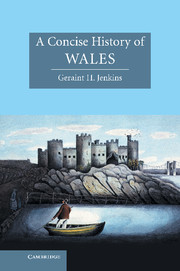Book contents
- Frontmatter
- Contents
- List of illustrations
- Preface
- 1 The earliest inhabitants
- 2 The Heroic Age, 383–1063
- 3 The Anglo-Norman conquerors, c. 1063–1282
- 4 Pestilence, rebellion and renewal, c. 1283–1536
- 5 Early modern Wales, 1536–1776
- 6 A crucible of the modern world, 1776–1900
- 7 Wales awakening? 1901–2006
- 8 Whither Wales?
- Sources of quotations
- Guide to further reading
- Index
- CAMBRIDGE CONCISE HISTORIES
1 - The earliest inhabitants
Published online by Cambridge University Press: 05 June 2014
- Frontmatter
- Contents
- List of illustrations
- Preface
- 1 The earliest inhabitants
- 2 The Heroic Age, 383–1063
- 3 The Anglo-Norman conquerors, c. 1063–1282
- 4 Pestilence, rebellion and renewal, c. 1283–1536
- 5 Early modern Wales, 1536–1776
- 6 A crucible of the modern world, 1776–1900
- 7 Wales awakening? 1901–2006
- 8 Whither Wales?
- Sources of quotations
- Guide to further reading
- Index
- CAMBRIDGE CONCISE HISTORIES
Summary
In a dimly lit room in a secluded but sturdy farmhouse in early eighteenth-century Cardiganshire, a gifted young Anglican ordinand, aptly named Theophilus Evans, composed in his native language an epic history of Wales which remained a bestseller until the twilight of the Victorian era. Entitled Drych y Prif Oesoedd (A Mirror of the First Ages) (1716), this racy historical narrative of the allegedly glorious origins of the Welsh was Evans's spirited riposte to English satirists who had painted unflattering portraits of Wales as ‘a country in the world's backside’ and as ‘the very rubbish of Noah's flood’. A superb storyteller, he packed his pages with more heroes and gripping incidents than any novel of blood and thunder might have done, and by conjuring up images of luminaries like Gomer, Brutus, Beli, Brân and Arthur (Boudica, styled ‘Buddug’ by Evans, was the only heroine to elbow her way into this pageant) he caught the imagination of the Welsh reading public and deeply shaped their view of the distant past. This was history, or perhaps mythical writing, on a grand scale, and the vivid tales and heroic victories and defeats in this unashamedly Cambrocentric work were so well tailored to the needs of a people desperately searching for their own national identity that it became a popular classic, especially when editions in the Victorian era began including vivid engraved illustrations.
- Type
- Chapter
- Information
- A Concise History of Wales , pp. 1 - 31Publisher: Cambridge University PressPrint publication year: 2007



